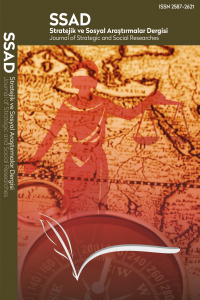YAPAY ZEKÂ İLETİŞİMİNDE CHATGPT: İNSANLAŞAN DİJİTALLEŞMENİN GELECEĞİ
Yapay Zekâ, ChatGPT, İletişim, İnsanlaşan Dijitalleşme
ChatGPT in Artificial Intelligence Communication: The Future of Humanized Digitization
Artificial Intelligence, ChatGPT, Communication, Humanized Digitization,
___
- AKTAY, S., SEÇKİN, G. Ö. K., ve UZUNOĞLU, D. (2023). Chatgpt in Education. Türk Akademik Yayınlar Dergisi (TAY Journal), 7(2), 378-406.
- ALSAMHI, S. H., MA, O., and ANSARI, M. S. (2019). Survey on Artificial Intelligence Based Techniques for Emerging Robotic Communication. Telecommunication Systems, 72, 483-503.
- BISWAS, S. (2023a). Role of Chat Gpt in Public Health. Annals of Biomedical Engineering, 51(5), 868-869.
- BISWAS, S. (2023b). The Function of Chat GPT in Social Media: According to Chat GPT. Available At SSRN 4405389. Erişim Adresi: http://dx.doi.org/10.2139/ssrn.4405389
- CASTELLS, M. (2008). Enformasyon Çağı: Ekonomi, Toplum ve Kültür- Ağ Toplumun Yükselişi. E. Kılıç (Çev.), (2. Baskı), İstanbul: İstanbul Bilgi Üniversitesi Yayınları.
- CHEN, L., CHEN, P., and LIN, Z. (2020). Artificial Intelligence in Education: A Review. Ieee Access, 8, 75264-75278.
- COPPIN, B. (2004). Artificial Intelligence Illuminated. Boston: Jones and Bartlett Publishers.
- ERUL, E. ve IŞIN, A. (2023). Chatgpt ile Sohbetler: Turizmde ChatGPT’nin Önemi (Chats With Chatgpt. Journal of Tourism and Gastronomy Studies, 11(1), 780-793.
- EU COMMISSION, (2018). The European Commission’s High-Level Expert Group on Artificial Intelligence The European Commission’s A Definition of AI: Main Capabilities And Scientific Discipliınes. Erişim Adresi: Https://Ec.Europa.Eu/Futurium/En/System/Files/Ged/Ai_Hleg_Definition_Of_Ai_18_December_1.Pdf.
- FOURATI, F., and ALOUINI, M. S. (2021). Artificial Intelligence for Satellite Communication: A Review. Intelligent and Converged Networks, 2(3), 213-243.
- GUNKEL, D. J. (2012). Communication and Artificial Intelligence: Opportunities and Challenges for the 21st Century. Communication+ 1, 1(1), 1-25.
- GUZMAN, A. L., and LEWİS, S. C. (2020). Artificial Intelligence and Communication: A Human–Machine Communication Research Agenda. New Media & Society, 22(1), 70-86.
- GÜNGÖR, N. (2018). İletişim Kuramlar ve Yaklaşımlar. (4. Baskı). Ankara: Siyasal Kitapevi.
- GÜNGÜR, N. (2020). İletişime Giriş. (6. Baskı). Ankara: Siyasal Kitapevi.
- HOHENSTEIN, J., KIZILCEC, R. F., DIFRANZO, D., AGHAJARI, Z., MIECZKOWSKI, H., LEVY, K., NAAMAN, M. & JUNG, M. F. (2023). Artificial Intelligence in Communication Impacts Language and Social Relationships. Scientific Reports, 13(1), 5487.
- JIANG, Y., LI, X., LUO, H., YIN, S., & KAYNAK, O. (2022). Quo Vadis Artificial Intelligence?. Discover Artificial Intelligence, 2(1), 4.
- KESKİN, E. K. (2023). Yapay Zekâ Sohbet Robotu Chatgpt ve Türkiye İnternet Gündeminde Oluşturduğu Temalar. Yeni Medya Elektronik Dergisi, 7(2), 114-131.
- KOÇYİĞİT, A. (2022). Sosyal Medya ve Algı Yönetimi. Konya: Eğitim Yayınevi.
- KOÇYİĞİT, M. ve KOÇYİĞİT, A. (2018). Değişen ve Gelişen Dijital İletişim: Yazılabilir Web Teknolojisi (WEB 2.0). V. Çakmak ve S. Çavuş (Ed.) içinde, Dijital Kültür ve İletişim (s. 19-48). Konya: Literatürk Academia Yayınları.
- KÖROĞLU, Y. (2017). Yapay Zekânın Teorik ve Pratik Sınırları. Boğaziçi Üniversitesi Yayınevi.
- KÖSE, U. (2021). Yapay Zekâ Kavramı. Köse, U. (Ed.) içinde, Yapay Zekâ Etiği (s. 1-16). Ankara: Nobel Akademik Yayıncılık.
- KÜÇÜKER, M. (2023). Muhasebede Yapay Zekâ Uygulamaları: Chatgpt’nin Muhasebe Sınavı. Fırat Üniversitesi Sosyal Bilimler Dergisi, 33(2), 875-888.
- LIU, Y., AL-ATAWI, A. A., KHAN, I. A., GOHAR, N., and ZAMAN, Q. (2023). Using the Fuzzy Analytical Hierarchy Process to Prioritize the Impact of Visual Communication Based on Artificial Intelligence for Long-Term Learning. Soft Computing, 27(1), 157-168.
- LO, C. K. (2023). What is the Impact of Chatgpt on Education? A Rapid Review of the Literature. Education Sciences, 13(4), 410.
- LUTTRELL, R., WALLACE, A., MCCOLLOUGH, C., and LEE, J. (2020). The Digital Divide: Addressing Artificial Intelligence in Communication Education. Journalism & Mass Communication Educator, 75(4), 470-482.
- MCGEE, R. W. (2023). Political Philosophy and Chatgpt. Working Paper, March 25. Erişim Adresi: https://ssrn.com/abstract=4399913 DOI: 10.13140/RG. 2.2. 30429.08163.
- MINH, D., WANG, H. X., LI, Y. F., and NGUYEN, T. N. (2022). Explainable Artificial Intelligence: A Comprehensive Review. Artificial Intelligence Review, 55, 1-66.
- SALVAGNO, M., TACCONE, F. S., and GERLI, A. G. (2023). Can Artificial Intelligence Help for Scientific Writing?. Critical Care, 27(1), 1-5.
- ŞENYAMAN, G. (2023). Arapça Yabancı Dil Öğretiminde Yapay Zekânın Geleceği: Chatgpt Örneği. RumeliDE Dil ve Edebiyat Araştırmaları Dergisi, (33), 1057-1070.
- WHITBY, B. (2008). Artificial Intelligence: A Beginner’s Guide. Oxford, U.K.: Oneworld.
- Wikipedia (2023, Mayıs), ChatGPT. Erişim Adresi: https://en.wikipedia.org/wiki/chatgpt
- Wikipedia (2023, Mayıs), Yapay Zekâ. Erişim Adresi: https://en.wikipedia.org/wiki/artificial_intelligence
- XU, G., MU, Y., and LIU, J. (2017). Inclusion of Artificial Intelligence in Communication Networks and Services. ITU J. ICT Discov. Spec, 1, 1-6.
- ZERFASS, A., HAGELSTEIN, J., and TENCH, R. (2020). Artificial Intelligence in Communication Management: A Cross-National Study on Adoption and Knowledge, Impact, Challenges And Risks. Journal of Communication Management, 24(4), 377-389.
- ZHU, J. J., JIANG, J., YANG, M., and REN, Z. J. (2023). Chatgpt and Environmental Research. Environmental Science & Technology. Erişim Adresi: https://pubs.acs.org/doi/pdf/10.1021/acs.est.3c01818.
- ISSN: 2587-2621
- Yayın Aralığı: Yılda 3 Sayı
- Başlangıç: 2017
- Yayıncı: Mehmet Ali KARAMAN
Odağı Engelliliğe Değil Yapabilirliğe Yöneltmek
ÖRGÜTLERDE ETİK DIŞI DAVRANIŞLAR VE PSİKOLOJİK YILDIRMA
“MEMLÛK” SÖZCÜGÜ: BASİT ANLAMINDAN ASKERİ VE SİYASİ TERİM ANLAMINA
SIFIRDAN AKILLI BİR KENT YARATMAK ÜTOPYA MI? DİSTOPYA MI?
SİLİFKE KALESİ HİSARPEÇE BÖLÜMÜ KAZILARI
Çin’in Yumuşak Güç Araçlarının İncelenmesi
NEFRET SÖYLEMİ VE İSLAMOFOBİ: FRANSA BASINI ÖRNEĞİ
SÜRDÜRÜLEBİLİR REKABET GÜCÜNÜN, İŞLETMELERİN PERFORMANSINA ETKİLERİNE YÖNELİK BİR ARAŞTIRMA
